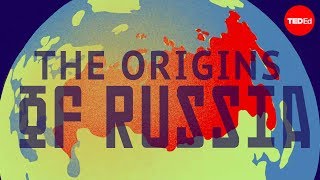(单词翻译:单击)
Where did Russia come from, why is it so big, and what are the differences between it and its neighbors?
俄罗斯起源于哪里,为何其幅员如此辽阔,它和其邻国有什么不同之处呢?
The answers lie in an epic story of seafaring warriors, nomadic invaders,
答案就在一个有着漂流的海上勇士,入侵的游牧民族,
and the rise and fall of a medieval state known as Kievan Rus.
以及在中世纪起起落落的国家--基辅罗斯中。
In the first millennium, a large group of tribes spread through the dense woodlands of Eastern Europe.
在公元后第一个千年,一个庞大的游牧民族开始向东欧繁茂的森林扩张。
Because they had no writing system, much of what we know about them comes from three main sources:
由于他们没有文字记载这段历史,我们主要通过三个途径了解这段历史:
archaeological evidence, accounts from literate scholars of the Roman Empire and the Middle East,
考古学的佐证,当时罗马帝国和中东地区文学家的记述,
and, lastly, an epic history called the Primary Chronicle compiled in the 12th century by a monk named Nestor.
以及,最后,由一名叫Nestor的游僧编篡的一部有时代意义的历史著作--《往年纪事》。
What they tell us is that these tribes who shared a common Slavic language
书中记述了这些部落共用着一套语言系统,斯拉夫语,
and polytheistic religion had by the 7th century split into western, southern and eastern branches,
并且共同信仰着多神教,在公元七世纪,他们分裂成西、南部和东部三个分支,
the latter stretching from the Dniester River to the Volga and the Baltic Sea.
东部分支从德涅斯特河伸展到伏尔加河,波罗的海等地。
As Nestor's story goes, after years of subjugation by Vikings from the north,
在Nestor记载的故事中,遭受了北边袭来的维京人多年侵扰后,
who, by the way, did not wear horned helmets in battle,
这里说的并不是带着牛角帽子的维京人,
the region's tribes revolted and drove back the Northmen,
当地人奋起并把这帮维京人驱赶了出去,
but left to their own devices, they turned on each other.
但当只剩他们自己的时候,他们又相互把矛头指向对方。
Such chaos ensued that, ironically, the tribes reached out to the foreigners they had just expelled,
讽刺的是,这样的混乱促使他们寻求之前的敌人--维京人--的帮助,
inviting them to return and establish order.
邀请着他们回来帮助建立秩序。
The Vikings accepted, sending a prince named Rurik and his two brothers to rule.
维京人欣然同意了,派遣来他们的王子Rurik和他的两个兄弟回来统治。
With Rurik's son, Oleg, expanding his realm into the south,
同时,Rurik的儿子Oleg开始在南部扩张他们的帝国,
and moving the capitol to Kiev, a former outpost of the Khazar Empire, the Kievan Rus was born,
不久后迁都到基辅,那是哈扎尔帝国曾经的边境小村,这同时也意味着基辅罗斯帝国的诞生。
'Rus' most likely deriving from an old Norse word for 'the men who row.'
“罗斯”是来自一个古老的挪威语,意思是 “划桨人”。
The new princedom had complex relations with its neighbors,
这个新成立的国家和他的邻国有着十分复杂的关系,
alternating between alliance and warfare with the Khazar and Byzantine Empires, as well as neighboring tribes.
它改变着哈扎尔和拜占庭帝国之间的利害关系,对其他的邻近部落也同样有些影响。
Religion played an important role in politics, and as the legend goes, in 987,
宗教在当时的政治系统中有着重要的影响,随着故事的发展,在公元987年,
the Rus prince Vladamir I decided it was time to abandon Slavic paganism,
罗斯的王子弗拉基米尔一世决定是时候放弃斯拉夫的异教信仰了,
and sent emissaries to explore neighboring faiths.
他向邻国派去了使者,让他们去研究当地的宗教。

Put off by Islam's prohibition on alcohol and Judaism's expulsion from its holy land,
他无法忍受伊斯兰不喝酒的传统,接受不了犹太人被驱逐出圣地的凄惨,
the ruler settled on Orthodox Christianity after hearing odd accounts of its ceremonies.
在听说了基督教的各式庆典后,他接受了正统基督教(东正教)。
With Vladimir's conversion and marriage to the Byzantine emperor's sister,
通过弗拉米尔的转变,还有他和拜占庭皇妹的联姻,
as well as continued trade along the Volga route, the relationship between the two civilizations deepened.
以及伏尔加河上蓬勃发展的贸易,两个帝国的关系更加紧密了。
Byzantine missionaries created an alphabet for Slavic languages based on a modified Greek script
在拜占庭的传教士根据改良版的希腊字母,为斯拉夫语创造了一套新的字母表的同时,
while Rus Viking warriors served as the Byzantine Emperor's elite guard.
罗斯帝国的维京战士在拜占庭帝国做一流的守卫。
For several generations, the Kievan Rus flourished from its rich resources and trade.
在很长的一段时间后,基辅罗斯由于自身广袤的资源和蓬勃发展的贸易变得十分强大。
Its noblemen and noblewomen married prominent European rulers,
在他们的贵族与欧洲其他的统治者联姻的同时,
while residents of some cities enjoyed great culture, literacy,
当地的居民们享受着他们自己伟大的文化,文学,
and even democratic freedoms uncommon for the time. But nothing lasts forever.
甚至是当时罕有的民主自由。但是好景不长。
Fratricidal disputes over succession began to erode central power
兄弟间争夺继承权的斗争使中央集权逐渐瓦解,
as increasingly independent cities ruled by rival princes vied for control.
王子争夺着不同城市的统治权。
The Fourth Crusade and decline of Constantinople devastated the trade integral to Rus wealth and power,
随着第四次十字军战争和君士坦丁堡的沦陷,基辅罗斯因贸易而积攒的财富和权力慢慢沦陷,
while Teutonic crusaders threatened northern territories.
当时日耳曼的十字军逐渐抵达了北部。
The final blow, however, would come from the east.
然而,压死骆驼的最后一根稻草来自东部。
Consumed by their squabbles, Rus princes paid little attention to the rumors of a mysterious unstoppable hoard
王子们执着于眼前的争吵,忽视了当地对于一个神秘、快速发展的组织的流言,
until 1237, when 35,000 mounted archers led by Batu Khan swept through the Rus cities,
直到公元1237年,成吉思汗率领着3500名骑兵横扫了基辅罗斯的所有城市,
sacking Kiev before continuing on to Hungary and Poland.
洗劫了首都基辅后又前往匈牙利以及波兰。
The age of Kievan Rus had come to an end, its people now divided.
基辅罗斯的时代告一段落,原基辅罗斯的居民如今也散布在世界各地。
In the east, which remained under Mongol rule, a remote trading post, known as Moscow,
在仍然被蒙古人统治着的东方,有一个叫做莫斯科的贸易点,
would grow to challenge the power of the Khans,
成长起了一股可以挑战蒙古可汗的团体,
conquering parts of their fragmenting empire, and, in many ways, succeeding it.
他们夺回了破碎帝国的部分领土,之后他们势如破竹。
As it absorbed other eastern Rus territories, it reclaimed the old name in its Greek form, Ruscia.
逐渐吸收了原属基辅罗斯的东部领土,他们改变了原来的名字,用了希腊发音,叫Ruscia。
Meanwhile, the western regions whose leaders had avoided destruction through political maneuvering
与此同时,西部地区的统治者们一直通过一些政治手段规避风险,
until the hoard withdrew came under the influence of Poland and Lithuania.
直到蒙古骑兵撤退,但他们仍然遭受着波兰和立陶宛的影响。
For the next few centuries, the former lands of Kievan Rus populated by Slavs,
在接下来的几个世纪期间,在基辅罗斯的这片领土上曾填满了斯拉夫人,
ruled by Vikings, taught by Greeks, and split by Mongols
曾被维京人统治,曾被希腊人教导,曾被蒙古人瓜分
would develop differences in society, culture and language that remain to the present day.
最终形成了其社会、语言、文化的多元,一直延续到今天。


